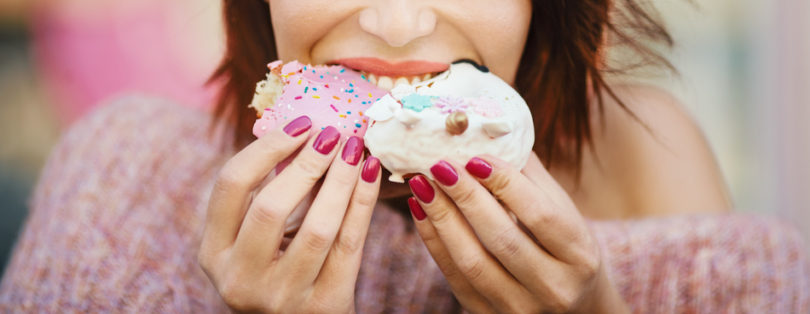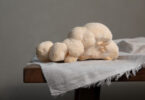You know that feeling. There’s a bag of chocolate chip cookies in the pantry, and you just can’t stop thinking about it. Even more, the pint of ice cream in the freezer seems to be calling for you.You try and distract yourself, but your mind keeps reminding you of those sweet, delicious treats you could be enjoying right now. Finally, you give in and decide to have just a small bite — okay, just one cookie, or maybe two — only to inhale the entire package until not one crumb is left. What’s left is an empty bag and you hating yourself because you were weak. Where does this insane craving for sweets come from? Is sugar really as addictive as some people say it is? Before you start booking yourself into rehab, hold up, because the science is conflicting. It sure as heck feels like a sugar addiction when you can’t distract your mind from those sugary treats — but that’s not quite what’s going on.
Sugar Addiction? It’s All About the Sugar Rush
What the scientists agree on is that sugar sparks the “reward” center of our brains, stimulating the pumping of dopamine into our systems. Dopamine is a neurotransmitter that tells you “hey, this stuff is good, have some more!” This is what causes sugar cravings — not an addiction to sugar itself, but to the rush of feel-good hormones you get whenever you eat it.
Beyond that, there’s very little support for sugar addiction in humans. Addiction is a serious medical condition where the brain actually changes to need more and more of the substance to get the same high. Researchers have seen these brain changes with drug addiction, but not with sugar. The bottom line: the consumption of sugar is not beyond our control.
If Craving Sugar is Not an Addiction, What is it?
The obvious answer is that sugar cravings are a habit. The difference between the two is dependence — addiction is driven by a need to do something while a habit is driven by the routine of doing it. As a society, we’ve developed habits around sugar consumption where our bodies have learned to expect to have sugar at the same time each day. If you can’t function without that caramel macchiato in the morning or the afternoon pick-me-up in the form of a cupcake, then you understand.
For sure, you need willpower to break a bad sugar habit. But it’s not impossible. You’re not going to experience any major withdrawal symptoms from sugar the same way you would if you stopped using heroin. Ditching the daily sugar “fix” is not going to interfere with your ability to turn up for work the next day. And it’s really worth thinking about if you want to tip your body into optimal health. You might also find yourself a little richer — those fancy $5 venti coffees can really add up.
The Ugly Truth About Sugar
The average American takes in 22 teaspoons of added sugar daily — almost four times the amount suggested by the World Health Organization. And it’s not only the obvious items like ice cream and cookies. Other big culprits are sugary drinks — sodas, Slurpees, fruit juices and yes, fancy coffee. Meanwhile, the evidence is mounting that sugar can do more damage than previously thought.
A diet heavy in sugar — even when it comes from natural sources such as fruit — increases your hunger more than any other type of carbohydrate. Not only does sugar spike insulin, a hormone that causes you to lay down fat, it also blocks leptin, a hormone that regulates hunger and tells your body to stop eating. Too much sugar is a clear risk for weight gain.
More worryingly, high sugar consumption spikes your triglycerides, blood sugar, blood pressure and inflammation — all risk factors for heart disease, diabetes, cancer and even dementia. Some researchers call Alzheimer’s “Type 3 diabetes.” High sugar intake has also been linked to acne, accelerated skin aging, bad teeth, depression and accelerated cognitive decline.
Don’t We Need Sugar?
No. You don’t need added sugar. Our brains need at least 130 grams of carbohydrates (520 calories) to work optimally according to the National Academy of Sciences. Carbohydrates are broken down into glucose in our bodies to create energy to survive. In the absence of sugar, the body is designed to use fatty acids for fuel. Even if you cut your sugar intake to zero, your body would function optimally by using fat as its main energy source.
So How do You Reduce Sugar?
Food manufacturers have found that with virtually every product they sell, they can add a little more sugar to make it tastier. The “bliss point” describes the sweetest and therefore the tastiest a product can be before adding any more sugar makes it too sweet. This is why sugar is in everything, from granola and bread to peanut butter and pasta sauce.
The most effective way to reduce your sugar intake is to eat mostly whole and unprocessed foods. However, if you decide to buy packaged foods, read the labels. Avoid anything with sugar near the top of the ingredient list and watch out for fancy marketing words for sugar like “evaporated cane juice” and “maltose.” These unfamiliar terms for sugar can easily fool us into eating more than we realize. And watch out for healthy-sounding ingredients like agave nectar, which actually contains 70-90 percent fructose and 10-30 percent glucose.
Some swaps are obvious. For example, ditching just one regular, 12-ounce can of soda cuts around 40 grams (10 teaspoons) of sugar from your daily diet. Other sources of sugar can take you by surprise. For instance, you might chalk a bowl of granola and a small cup of low-fat, fruit-flavored yogurt as a super-healthy breakfast, but when you read the nutrition label, you could be taking in 30 grams of added sugar — more than a Snickers bar!
An apple contains naturally occurring sugar, but it also has fiber, which slows digestion. Your body will experience less of a blood-sugar spike after you eat an apple than if you had, say, a soda. “This doesn’t mean that you can eat all you want of natural sugars. You still need to have portion control,” says Alissa Rumsey, a nutritionist and spokesperson for the Academy of Nutrition and Dietetics.
What About the Sugar Cravings?
Sure, fighting sugar cravings can be a challenge at the start. You’ve stopped giving your body something it has been trained to expect so of course, it’s going to fight back. If you pick up a muffin on auto-pilot each day after lunch, then your body is going to be stuck on those routines.
You need to tackle this with the attitude that sugar does not improve your life in any way; it simply gives you a temporary dopamine hit. When you’re not dependent on sugar, then your baseline mood and energy stays constant all day. You don’t get the post-lunch slump or the highs and lows of blood-sugar crashes. And the longer you go without sugar, the more stable you feel — most people feel the benefit in as little as one or two weeks.
Here’s another trick: keep a food diary. Write down what signals your body is sending you when a craving comes up (boredom, stress, time of the month and so on). This information is ammo for when you next get a craving so you can get it under control and let it pass. Also important is not to starve yourself. Sometimes we experience cravings when we are thirsty or hungry. Often a glass of water and a healthy snack including some protein and fats — such as a hard-boiled egg and a handful of nuts — can successfully stave off that craving.
Eat Well, Be Happy
Ultimately, your body doesn’t need sugar for survival. Having less is better. That doesn’t mean you can’t enjoy the occasional dessert without feeling guilty. But there is simply no nutritional value in adding sugar to your diet. We should all be looking to protein, fat, complex carbs and plenty of veggies for nutrition — these are the things that our bodies truly love. Combine these foods with a good exercise program, and you’re going to look and feel amazing!
The 56 Most Common Names for Sugar
- Agave nectar
- Barley malt
- Beet sugar
- Blackstrap molasses
- Brown rice syrup
- Brown sugar
- Buttered syrup
- Cane sugar
- Cane juice crystals
- Caramel
- Carob syrup
- Castor sugar
- Coconut sugar
- Confectioner’s sugar (powdered sugar)
- Corn syrup
- Corn syrup solids
- Crystalline fructose
- Date sugar
- Demerara sugar
- Dextrin
- Dextrose
- Diastatic malt
- D-ribose
- Ethyl maltol
- Evaporated cane juice
- Florida crystals
- Fructose
- Fruit juice
- Fruit juice concentrate
- Galactose
- Glucose
- Glucose solids
- Golden sugar
- Golden syrup
- Grape sugar
- High-Fructose Corn Syrup (HFCS)
- Honey
- Icing sugar
- Invert sugar
- Lactose
- Malt syrup
- Maltodextrin
- Maltose
- Maple syrup
- Molasses
- Muscovado sugar
- Panela sugar
- Raw sugar
- Refiner’s syrup
- Rice syrup
- Sorghum syrup
- Sucanat
- Sucrose
- Treacle sugar
- Turbinado
- Yellow sugar



